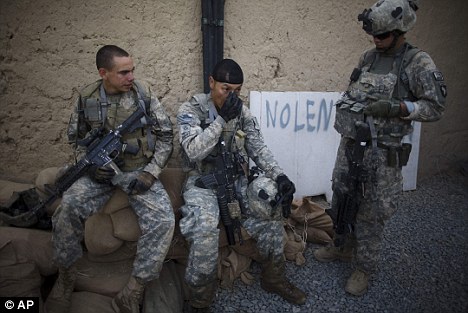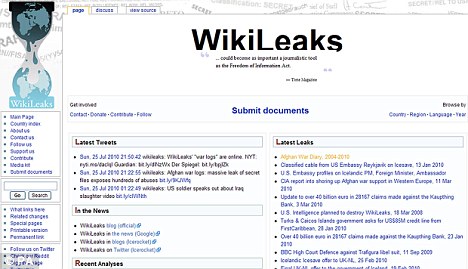
Washing
the dirty linen of a dirty conflict in public could actually save lives
 |
|
Washing
the dirty linen of a dirty conflict in public could actually save lives |
|
| By Max Hastings Last updated at 10:21 AM on 27th July 2010 | |
To understand how the White House feels about yesterday’s massive leak of 92,201 documents about the Afghan war, think how Downing Street would have felt about the same sort of disclosures during the Northern Ireland troubles. |
|
| We might have learned about Blair’s talks with the IRA, SAS ambushes in Armagh, British intelligence penetration of the Dublin government, claims of torture of suspects, fire-fights in which the wrong people got killed, paramilitary links with politicians - the dirty underclothes of a dirty conflict. | |
| A lot of faces would have gone a deep red. | |
 |
|
No
end in sight: U.S. soldiers resting in the volatile Arghandab Valley yesterday |
|
| This week’s Wikileaks dumper truck of military log reports on Afghanistan between 2004 and 2009 does nothing much to increase our knowledge of a shambolic conflict the West is not winning. | |
| But it is deeply embarrassing for the U.S. government and its allies, because it officially endorses much that has hitherto been only scuttlebutt. | |
| For starters, there is Pakistan, supposedly our ally in the ‘war on terror’, to which $5billion of new American aid has just been voted by Congress. | |
| The Islamabad government professes support for the West in Afghanistan. | |
| But the only Pakistani institution that counts is the army and its powerful intelligence service, the ISI. | |
| The Wikileaks document confirms Washington’s belief that the ISI is backing the Taliban. | |
| Why? Because Pakistan hates India. | |
| The Indians have been playing a recklessly irresponsible diplomatic game, seeking to build up influence in Afghanistan simply to increase their leverage on the western frontier of Pakistan. | |
| The Pakistani army, in its turn, aids the Taliban partly because it is deeply infiltrated by Muslim radicals, and chiefly because it thinks the Kabul government too close to the Indians. | |
| Washington knows all this, but President Obama cannot for the life of him think what to do about it. there has been much excitement about the leaked document which highlights the U.S. army and navy’s task Force 273, conducting targeted assassinations of Taliban leaders. | |
| Britain’s SAS and SBS are also heavily involved, as they were in Iraq. | |
| A former SAS commanding officer revealed last year that his unit had been responsible for ‘taking out’ an astonishing 1,500 Al Qaeda in and around Baghdad. | |
| ‘Decapitation’ of the enemy leadership by hit teams in Afghanistan, and by airborne drones operating over the Pakistan border, is reckoned to be the most effective single element of the allied war effort. | |
| Yesterday’s revelations confirm this is happening, but personally I cannot get too upset about the ethics. If you fight a war, killing the other side’s commanders makes sense. | |
| My military friends say that if some Taliban leaders can ever be persuaded to negotiate a political deal, decapitation will have done more than anything else to bring them to the table. | |
| Dozens of leading Taliban and al Qaeda chiefs have been killed in recent months, and the survivors are rattled. The leaks detail many cases of civilians killed in the course of allied operations — including targeted assassinations. | |
| We knew this was happening. The log also records hundreds of deaths of Afghan civilians at the hands of Taliban bombs or gunmen. | |
| These are scarcely mentioned in the Western media, because they are not ‘our people’. | |
| I was shocked to hear last year that scores of Afghan drivers who truck in supplies for Nato’s forces die regularly on the road from Pakistan, without anyone taking much notice. Some Nato contingents are paying huge secret bribes for safe passage. | |
| Nato commanders discovered a few weeks ago that the Dutch, whose contingent is soon to quit Afghanistan, have been paying $3,000 a truck to a local Popolzai warlord named Matiallah Khan, to get their goods safely through the 100 miles of territory which he controls. | |
| To understand the tortured nature of Afghan politics, you should know that Matiallah Khan is not a Taliban leader, but a close associate of President Karzai. | |
| How, then, can he protect Dutch convoys from stick-ups and IEDs? | |
| Provide your own answer, and it’s not a pretty one. | |
| Wikileaks’ self-aggrandising founder Julian Assange makes ambitious claims for this week’s revelations, which he calls ‘the Afghan War diary’. | |
| Some people compare them with the Pentagon Papers, leaked in the Seventies to devastating effect. | |
| But the Pentagon Papers detailed how America’s top leadership took the country into the Vietnam War. | |
| This stuff, by contrast, is merely a low-level record of a horribly messy struggle in which planning has been incoherent, and it is hard to figure out whose side many local players are on. | |
| It runs only to 2009, before the strategy of troop surges by General McChrystal and a change of approach kicked in. | |
| Nonetheless, it reinforces American voters’ perception that their country has got itself into a terrible mess, from which evermore they want their President to extricate them. | |
| They were told, as we were, that U.S. forces were committed to freeing Afghanistan from Al Qaeda. | |
| Yet CIA chief Leon Panetta recently estimated that there are only 100-150 Al Qaeda adherents in the country. | |
| Both Barack Obama and David Cameron claim we are seeking to stabilise Afghanistan to help prevent Pakistan from imploding. | |
| But it is almost impossible to help the Pakistanis, when their own army is working hard for the other side. | |
| The British people, sensibly enough, care chiefly about what all this means for our soldiers, daily risking their lives on the ground. | |
| We cannot just fold our tents without doing intolerable damage to the Atlantic Alliance. | |
| But I have believed for a long time that American patience with Afghanistan will expire much more quickly than Washington publicly suggests. | |
| When the U.S. quits, so can we. | |
| Yesterday’s revelations will reinforce the American people’s eagerness to renounce a commitment which seems to be getting nowhere. | |
| My military friends on both sides of the Atlantic say that in recent months they have made real headway on the battlefield. | |
| But some of us have always argued that we can win endless firefights in Afghanistan without achieving anything, if there is no credible local political structure to support. | |
| The regime of President Hamid Karzai is irredeemably corrupt, incompetent and unpopular. | |
| We can fight on until doomsday without changing that, and President Obama knows it. | |
| For all the undoubted brilliance of new U.S. commander General David Petraeus, he cannot make bricks without Afghan straw. | |
| The most likely outcome is that we shall declare victory and come home some time quite soon, thank goodness. | |
| There has been much talk about fighting on until 2014. I believe that even if we keep going until 2054, Afghanistan will still be ungovernable. | |
| None of us would be any better off. The Afghan people know we shall not stay, whatever our Government’s claim to the contrary. | |
| The Pashtuns in the south thus have not the smallest incentive to disown the Taliban, with whom they must live afterwards. | |
| The only way forward is for President Obama to start a political process, involving the Taliban and its leader Mullah Omar, which gives our departure a figleaf of dignity. | |
 |
|
| The site that wobbled the White House: A screen grab of the WikiLeaks website | |
| If he fails to do this, he will betray his responsibility to his own people, to his allies and especially Britain, and to the Afghans. | |
| Yesterday’s Wikileaks ‘revelations’ made a bigger splash than they deserved. | |
| But they will serve a useful purpose if they concentrate minds at the top. | |
| If we wait for military success before starting a political negotiation, a lot more good people will die uselessly. It is time to talk, and start packing. | |
| Well.... | I was initially disgusted by WikiLeaks' approbation into what should not be effectively given to the enemy.... |
| But then, it does give a little understanding of what is required in modern war to the public. And all those dissenters will just have to realise who we're having to fight. They're not nice, and neither will our methods of dealing with tem be. There is no choice, so stop watching films and thinking you have any idea of what our men are having to deal with. | |
| Whilst I don't agree with all of Hastings words, it's good to see a parallel to Northern Ireland, and to raise that conflict's often misquoted strains on British rule. Equally, the blame for the difficulties in the Afghan deployment has to be laid at the correct doors (especially who is responsible for the majority of so-called civilian deaths). | |
| Thank you Mr. Hastings for not succumbing to application of Western ethics to the situation, and for mentioning what it is that soldiers have to do there. | |
 |
|
The
article is available from: |
|